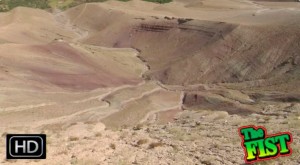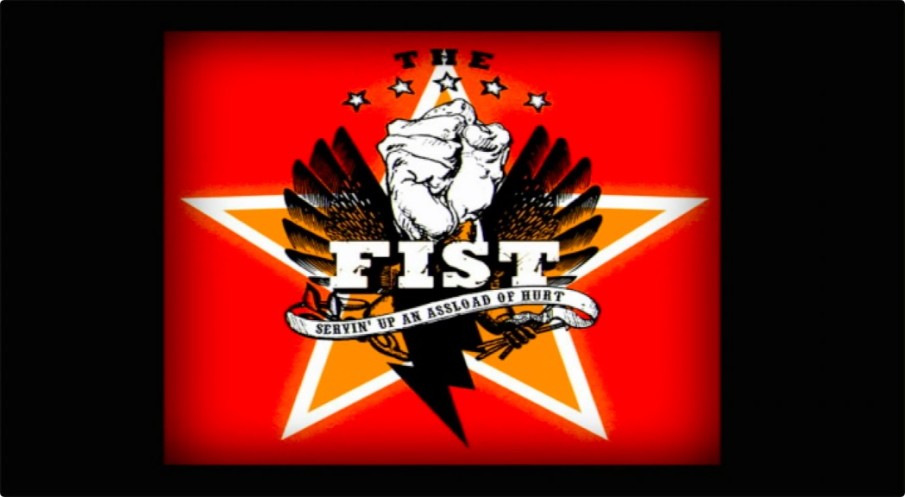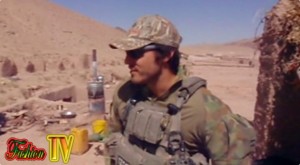Our lives were at risk the minute we chose to pursue this job as a profession. In regards to The Fist, there was nothing dangerous about what we did. You are making a factually incorrect assessment based on a video you watched from the comfort of your office. Just as the old adage states that the man on the ground is always right, you were not there so your articles are nothing more than an inaccurate second hand assessment.
“Made at the end of 2009, it includes a string of episodes more than an hour long…”
The entire company video was one hour and seventeen minutes long. There were four episodes of The Fist within this video, with the first episode being approximately 7 minutes long, the second episode being approximately 8 minutes long, the third episode being approximately 15 minutes long, and the final episode being approximately 12 minutes long. So in total, that is just over 42 minutes. Not a “string of episodes more than an hour long”. Your facts are wrong. This is called accountability. Learn it.
“…showing some of the commandos undertaking risky behaviour including drunken games, fighting…”
One could easily classify all of our rotations as highly risky based simply on the nature of the job. Just ask anyone insured with D-Pax Insurance who, not too long ago, decided to introduce the “Optional High Risk Location cover” – as well as a hefty monthly installment to match – for soldiers deployed to Afghanistan. Also, and while you’re in the mood of making a list, you failed to include all of the exceptional accomplishments that our unit has achieved whilst “undertaking risky behavior.” You don’t mention the fact that day after day, week after week, month after month, rotation after rotation, we volunteer for one of the most dangerous jobs in the world to protect the freedoms which give you the right to be such a judgmental parasite. Instead, you just included those which supported your unfavourable story. Biased, much?
Putting aside Defence’s policy on drinking whilst on deployment, though, what is risky about grown men having a drink in the confines of our living quarters? We lived in Camp Russell which was completely segregated from the rest of Multi-National Base Tarin Kot (MNB-TK). Our interaction with anyone outside of our task group was minimal, and no one except TF66 personnel were allowed onto our base and definitely not anywhere near our accommodation.
How many people in Australia enjoy a drink every single day after work? How many people in Australia go out after work on Friday to unwind from the stresses of the week? To the journalist who penned this article, what are the biggest stresses that you face on a daily, weekly, and even monthly basis as part of your job? Is it achieving a deadline? Is it finding relevant articles to report on? Is it the constant worry about getting a paper cut or forgetting to ask for soy milk in your daily coffee? I can guarantee that the associated risks between our relevant jobs are simply not comparable.
Let me elaborate further on what our worries were every time we stepped out to work. Or rather, should I say, what has actually happened to guys on operations in Afghanistan to make these worries a reality. Put simply, friends have been seriously injured and others have been killed. Some have been shot, some have been blown up, others have suffered life changing injuries. Some guys have worked frantically to save a friend who was a triple amputee as the result of an IED blast which later claimed his life. Other guys have volunteered for an end-to-end anastomosis (direct blood transfusion) to try and save their best friend while watching their life slip away, with them eventually succumbing to their injuries.
Others have been involved in two separate helicopter crashes which have not only claimed the lives of five commandos in Afghanistan, but forever changed the lives of those who survived. Guys have seen their team mates ripped apart, receive multiple gunshot wounds, have seen coalition soldiers burn to death, have had to pick up pieces of some who have been blown apart in IED strikes, and others have carried friends who have been killed in action over extremely long distances covered head to toe in their blood. These are just naming a few of the “stresses” that go hand in hand with our job.
In fact, the 2nd Commando Regiment has had more soldiers killed in Afghanistan than any other unit in the ADF. Out of the 41 Australians killed, 12 have been from our unit, with another four having been attached to us in support roles at the time they were killed in action. That’s 16 people out of 41 that have died during commando-led operations. To make it easier for you to understand, that’s nearly 40% of total Australians KIA in Afghanistan being a member of, or attached to, the 2nd Commando Regiment at the time of their deaths.
So tell me, what was your point again?
“…sunbaking and skylarking in enemy areas without their protective body armour.”
Again, you are making a factually incorrect second hand assessment based on a video you watched from the comfort of your office. I know that you do not understand tactical principles such as defence-in-depth, or even bother to acknowledge that, despite what you may have read, not everywhere in Afghanistan had us digging foxholes with our eyelids to stay alive. We weren’t up to our knees in grenade pins or tearing through thousands of rounds of ammunition everywhere we went.
Our vehicle harbours were always in tactically sound locations. For extended stays, our harbours could be 5+ km (3+ miles) from the nearest village or road. We don’t live in body armour. We take it off when we assess it’s safe to do so. For those guys who were filmed sunbaking and not wearing body armour, it was done so when they were off picket and on forced rest. What they do during these periods of downtime is entirely up to them and has no relevance to you, the media, or the general public. Your assessments could not be further from accurate.
“Garth Pratten, from the Strategic and Defence Studies Centre at the Australian National University, said the actions of some commandos have long been a source of friction among other army personnel. He said there had been ill feeling, particularly about them being allowed access to alcohol and publicly abusing it, while others were restricted.”
As we always say, getting to the unit is only a selection away. If it’s a source of friction and causing “other army personnel” so much anxiety, then by all means give selection a go like we did. There’s no point wallowing in the things you don’t have or wasting energy on your “haves and have nots.” If you want something bad enough, you will find a way. There should be more focus on your job and less on what’s happening on the other side of the fence.
“[There’s] vision from a helmet camera capturing scenes while engaged in gun battles in a valley, and there are episodes titled ”Sending up an arsehole of hurt.'”
Firstly, and to correct your work again, it was not “Sending up an arsehole of hurt” but “Servin’ up an Assload of Hurt.” Secondly, no episodes were titled this. The statement formed part of The Fist’s logo which I have used for the main photo of this article for your reference. Thirdly, we are a special forces unit deployed to Afghanistan to target and kill senior insurgent leaders. What would you prefer we serve them?
Should we extend an invite to them to join us for dinner so we can split some naan, share some tea, pay some compliments to how pretty his chai boy is, and maybe we can talk about our differences like adults? Don’t be blinded by your political correctness or censored version of life. War is a dangerous and violent series of events. Make no mistake about it. An assload of hurt was applicable in both statement and practice.
“In some scenes commandos are standing on the top of their vehicles, still armed, and playing golf, not watching for the enemy.”
Not “watching for the enemy”? Sure. OK. If our unit ever needs tactical advice from a second rate journalist we’ll be sure to let you know. Please refer back to the sunbaking and skylarking rebuttal for this one.
“There is a segment called the ”10th annual boulder throwing competition” in which commandos on patrol dig up a boulder and send it rolling down a hillside onto civilian roads below them.”
This has to be the most factually incorrect statement in the article and has clearly been written to evoke feelings of disdain toward our so-called “risky behavior.” In fact, it is so much of a lie I’ve taken the honour of providing a screen shot to prove my case. The photo shows where the boulder came to rest. There is not a road in sight. There is nothing that even looks like a road. The only thing that was there are dry wadis and dirt. To insinuate that anyone from our Regiment would place non-combatants lives at risk by rolling boulders onto civilian roads is deplorable. Your description is not only inaccurate, but completely fabricated.

A screen shot showing where the boulder came to rest with not one road in sight.
Although this type of sensationalistic reporting does not surprise me, I could not let this article go unchallenged. The accusatory nature in which it was written, backed up by half-truths and complete fabrications, was all the motivation I needed to set the record straight.
By admission of many a journalist, TF66 and, in particular, Force Element Bravo (FE-B or the 2nd Commando Regiment), did all the heavy lifting in Afghanistan. We have suffered the most killed in action and have been awarded the most gallantry awards out of any other unit in the ADF. It is two ends of a bitter-sweet continuum but a necessary comparison which undoubtedly proves my point. Heaven forbid that we choose to unwind and provide some comic relief from the demands of war in the form of a private video.
The fact that this has been a “year-long investigation” is also indication in itself of the type of wasted energy being focused on irrelevant and nonsensical stories. The Fist was meant for our eyes only. It didn’t affect anyone but us. We didn’t commit a crime and it wasn’t anyone’s business but ours. God only knows the types of stories that would come from a Fairfax Media Christmas party if the surface was ever scratched. But that’s not our job and nor do we care. We forge reputation and accomplishments off of traits such as honour and integrity, and our actions and achievements in Afghanistan and elsewhere speak for themselves. If only these people would take a page out of our book and use it as a moral compass…











COMMENTS